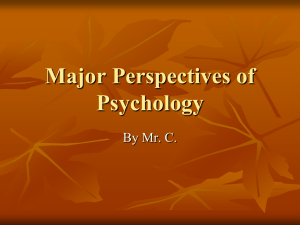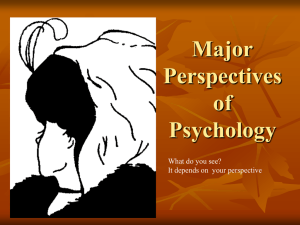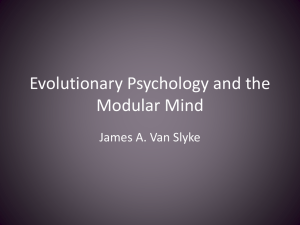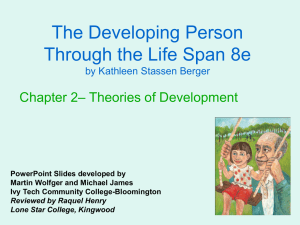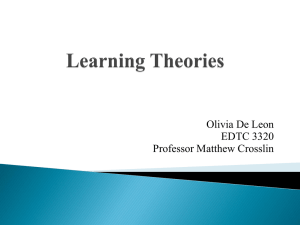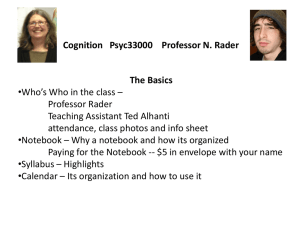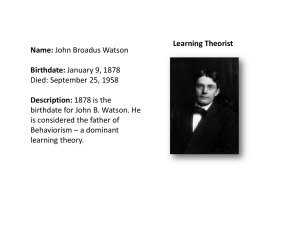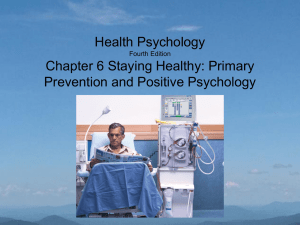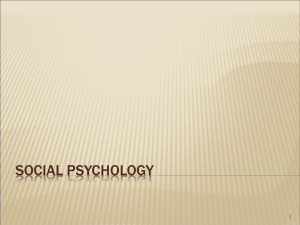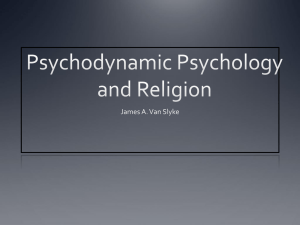chpt. 1 ppt
advertisement
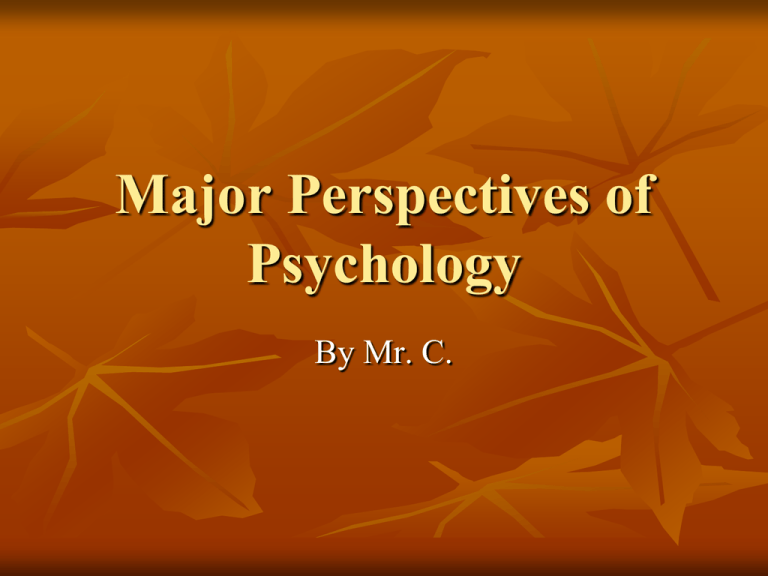
Major Perspectives of Psychology By Mr. C. Perspectives Psychoanalytic Behaviorism Humanism Cognitive Evolutionary Biological/Biomedical Psychodynamic The psychodynamic perspective originated with the work of Sigmund Freud. This perspective emphasizes the role of the unconscious mind, early childhood experiences, and interpersonal relationships to explain human behavior and to treat people suffering from mental illnesses. Our personality is a conflict between our unconscious Id and our superego (our moral sense) and our ego (our sense of reality). Defense Mechanisms Psychoanalysis Psychoanalysis is the form of treating psychological disorders, invented by Freud. It is famous for the couch. A. What are Psychoanalytic methods of therapy (4 of them): 1. Free Association – patient reports anything that comes to his/her mind. The psychoanalyst listens for links & themes that might tie the patient’s fragmentary thoughts or remarks together. B. Dream analysis: Dreams have two types of content: Manifest content- actual events in dream. Latent content – hidden message in dream. Freud thought that each dream represents a form of wish fulfillment. The wish may be disguised, but it is always there. C. Transference Feelings of love or other emotions (hatred) are expressed toward the therapist. These feelings are actually unconsciously felt toward others; the patient is projecting these feelings onto the therapist. This provides clues about the client’s feelings about these other people. Hypnosis Hypnosis is a psychoanalytic therapeutic technique. Supposedly reaches into the unconscious Psychoanalysis summary All methods deal with accessing the unconscious mind Psychoanalysis is therapist-centered, meaning the therapist has all the answers, not the patient. Personality assessment Psychoanalysts use projective tests like the Rorschach Ink Blot test or the TAT test Assessing achievement motivation The TAT Thematic Apperception Test Criticisms of Freud’s theory: 1. Freud had no scientific data to support his theories. 2. Freud’s theories (unconscious, libido, etc.) cannot be observed. 3. Theory explains behavior (post-hoc) after the fact. 4. Observations not representative of population (very sexist and not multicultural). Pros of Freud’s theory 1. Argued that childhood experiences are important in personality development. 2. Information outside of awareness does influence us. 3. Defense mechanisms—good descriptions of some of our behaviors. Behaviorism Behaviorism By the 1950s, Psychoanalysis seemed very unscientific. Behaviorists will bring science back into psychology, even if they overdo it a little. Behaviorism is NOT interested in the unconscious mind since it cannot be observed in a laboratory. Very telling quote!! Give me a dozen healthy infants, well-formed, and my own specified world to bring them up in and I’ll guarantee to take any one at random and train him to become any type of specialist I might select -- doctor, lawyer, artist, merchant-chief and, yes, even beggarman and thief, regardless of his talents, penchants, tendencies, abilities, vocations, and race of his ancestors. --John Watson, Behaviorism, 1930 Thorndike “law of effect” Basically, he was Skinner “lite.” The law of effect principle developed by Edward Thorndike suggested that responses closely followed by satisfaction will become firmly attached to the situation and therefore more likely to reoccur when the situation is repeated. Conversely, if the situation is followed by discomfort, the connections to the situation will become weaker and the behavior of response is less likely to occur when the situation is repeated. Ivan Pavlov He was not a psychologist but a Russian physiologist. He discovered classical conditioning. Classical conditioning is associative learning. He trained a dog to drool to a bell. Dog associates food with bell. B.F. Skinner B.F. Skinner is the most famous of the Behaviorists. He is famous for operant conditioning. Operant conditioning (aka shaping) is learning through reinforcements (rewards) and punishments. Behaviorism Albert Bandura did a famous experiment that said our behavior does not have to be classically conditioned or operant conditioned. We can simply observe behavior and copy it. Behaviorism The behavioral perspective can explain why people get addicted to gambling (positive reinforcement) Why students don’t wear their id badge (rewards of the adrenaline rush?) Why that girl won’t call you anymore (How was she reinforced for calling you?) Behavioral Therapy Focuses on maladaptive behaviors (mal means bad) and changing them. Token economy uses positive reinforcement to get large groups of students or mental ward patients or employees to do something like clean up or attend group therapy. (ex: pizza party if you all pass your test) Behavioral therapy Systematic desensitization – treatment of phobias and anxiety. Treat the behavior of not freaking out over spiders (or pickles). Behavioral therapy Aversive conditioning – There is a drug called Antabuse. When mixed with alcohol, it makes you sick. Motivated alcoholics will take this pill and begin to associate the sickness with alcohol and possibly stop drinking. Behaviorism Summary Behaviorism says we do what we do because of classical conditioning, operant conditioning or we simply learn the behavior from watching or copying it. In its extreme, they think we are simply rats in a cage pressing buttons. WE HAVE NO FREE WILL! Humanism Humanistic Humanism came about in the 1960s in reaction to psychoanalysis and behaviorism. Humanistic psychology was instead focused on each individual’s potential and stressed the importance of growth and selfactualization. The fundamental belief of humanistic psychology was that people are innately good. We are not rats in a cage! We are not id-driven animals! We are humans with free will. Humanism Abraham Maslow said we have a hierarchy of needs Humanism Carl Rogers revolutionized talk therapy. His therapy is client-centered, where the client has all the answers instead of the therapist. Therapists treat the client with unconditional positive regard (no judgments). Group therapy comes from Humanism. REAL IDEAL Incongruent self: neurosis REAL IDEAL Incongruent self: psychosis (shattered self) Fully-Functioning Individual Congruence! Open to experiences Freedom from society Creativity Carl Rogers’ fully functioning Individual Humanism summary Humanists are really touchy-feely, but without them we are just rats in a cage. Rogers and Maslow put the “human” element back into psychology and therapy. Their philosophy: We are all humans striving to maximize our potential. A therapist’s job is to remove obstacles to self-actualization. Positive psychology comes from Humanism Cognitive Psychology Cognitive Perspective What does the word cognitive mean? How about cognition? Recognition? It is the study of how people perceive, remember, think, speak, and solve problems. Cognitive therapy is about changing the maladaptive thoughts of a person. Cognitive Psychologists Alan Baddeley studied memory. He’s famous for his model for working memory (STM) Cognitive Psychologists Jean Piaget studied cognitive development in children. Cognitive perspective on depression We are depressed because we are irrational. Our expectations are too high and misplaced. We want everyone to love us and accept us. We want every thing to go our way. We stay angry about stuff that happened a looong time ago. WE MUST CHANGE THE WAY WE THINK TO BE HAPPY AND SUCCESSFUL. Cognitive Therapy Cognitive therapy is about changing the maladaptive (bad) thoughts. Albert Ellis, Aaron Beck and William Glasser are famous for reality therapy. They challenged his patients to ask, “Are my thoughts realistic or rational?” Cognitive therapy also “educates” the client, teaches him/her proper behaviors/thoughts Evolutionary Psychology Evolutionary psychology examines psychological traits — such as memory, perception, or language — from a modern evolutionary perspective. It seeks to identify which human psychological traits are evolved adaptations, that is, the functional products of natural selection or sexual selection Evolutionary Psychology This branch explains why humans do what they do in terms of adaptive value (survival of the species. Why do women usually prefer the guy on the right for long-term relationships? Evolutionary Psychology Why do women spend so much money on a weekly basis but men will surprise their wives with a brand new car (without asking her)? Evolutionary psychologists try to explain this behavior with comparisons to hunter-gather cultures. Why do women have more bug phobias? Biological Perspective This perspective is among the most respected right now. They focus on our brain, nervous system, neurotransmitters and hormones to explain our behaviors. Biological Perspective “I don’t know why you are depressed or anxious. But here is some medicine!” Love is simply oxytocin in your brain. Surgeries The Lobotomy damages your frontal lobe to relieve you of anxiety. Surgery Cut the corpus callosum to keep seizures from spreading to other side of brain. Electroconvulsive Therapy ECT Common medicines Prozac – antidepressant – blocks reuptake of serotonin. Xanax – anti-anxiety (side effect of drowsiness) Thorazine – replaced the lobotomy
